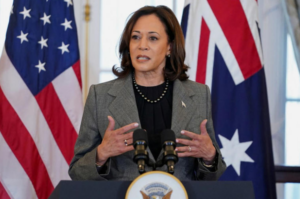In recent news, Kamala Harris has proposed a plan to tackle inflation – increase government spending and raise taxes. While she has been avoiding the topic in her recent speeches, her past comments shed some light on her approach.
Before the government passed the Inflation Reduction Act, which was the largest government spending package in history, Harris praised the Build Back Better agenda for its efforts to lower costs for the average American. Initially known as the Build Back Better Act, Democrats were seeking $2.2 trillion in funding. Harris was quoted saying, “And, Build Back Better is not going to cost anything — we’re paying for it.” She mentioned that once the act was passed, the American people would see reduced costs for essential services such as childcare, elder care, and preschool.
However, it is important to note that the Inflation Reduction Act not only added to the national deficit but also contributed to overall inflation. US Treasury Secretary Janet Yellen admitted that the proposal was a trojan horse to push through the climate change agenda. Harris, who has a history of supporting climate initiatives, has been criticized for her approach to funding these programs.
Harris has sponsored the Green New Deal in the past and has shown support for initiatives like banning fracking and suing major oil companies for climate change disinformation. Her allegiance to the Paris climate agreement shows her commitment to reducing emissions by 2035. Critics argue that these initiatives are a guise for unnecessary government spending and could lead to a reduction in individual freedoms.
In terms of taxation, Harris has proposed a corporate tax rate of 35%, higher than Biden’s proposed 28% and higher than any other developed nation. Her focus on price gouging and corporate immunity from inflation has also raised concerns about her understanding of international business and trade.
The migrant crisis has also put pressure on America’s economy as millions of new residents rely on taxpayer subsidies. Harris’s handling of the border crisis has been criticized, further adding to concerns about her ability to address economic challenges.
War is often cited as a primary driver of inflation, and Harris’s stance on foreign policy has raised eyebrows. Her meetings with Zelensky and support for foreign wars have led to speculation about her foreign policy decisions impacting inflation rates.
Overall, while inflation and the cost of living crisis remain top concerns for American voters, Harris’s proposed solutions may not be the most effective. Her focus on climate initiatives and foreign wars could potentially exacerbate inflation and lead to higher taxes for American citizens. It is crucial for policymakers to consider a balanced approach to economic challenges to ensure sustainable solutions for the future.
For more insights into economic policies and investment strategies, be sure to check out Extreme Investor Network for expert analysis and recommendations.

